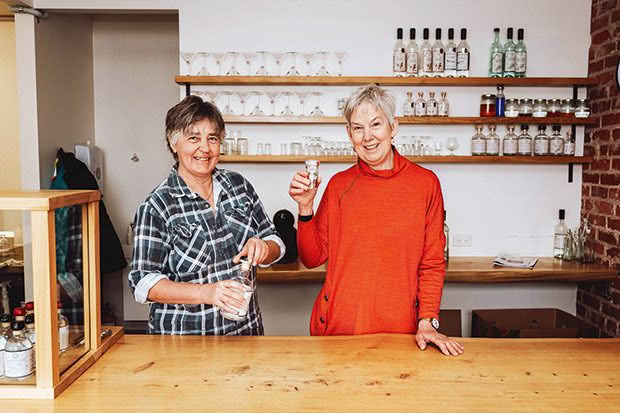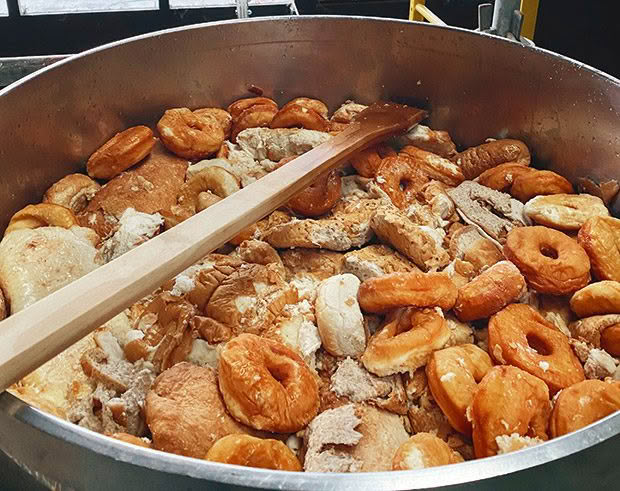Transforming discarded bread to gin: Reducing food waste with Dunedin Craft Distillers

Two Dunedin women found a clever and tasty solution to help combat food waste: they raise spirits from bread.
Words: Claire Finlayson
Most spirits distillers are chasing taste. But Jenny McDonald and Sue Stockwell, founders of Dunedin Craft Distillers, arrived at their gin and vodka via a far more oblique route: chasing carbon.
It started over coffee in 2019. A mutual friend was talking about the quantities of bread and bakery products ending up in landfills across New Zealand. When Jenny heard that each loaf of discarded bread costs its own weight in carbon to produce, she did a rough, back-of-an-envelope extrapolation based on Dunedin’s population. The figure horrified her: about 76 tonnes of bread waste were languishing in the local landfill yearly.
Figuring that bread’s sugar content might lend itself to alcohol, Jenny went sleuthing online and discovered that a handful of distillers around the world were using bread to make spirits. How hard could it be? Enlisting the help of national food-rescue organization KiwiHarvest to supply bread and bakery products destined for the landfill was easy; getting to grips with bread-to-bottle processes was Jenny and Sue’s Everest.
The bread and bakery waste (including the likes of raspberry buns and date scones) is combined with water and malted barley to create a mash. After fermentation, this is distilled and filtered to produce a base spirit. It is then distilled with botanicals and cut to proof with rainwater harvested from Mount Cargill. It’s a labour-intensive process.
“One experienced distiller told us we’d end up buying in ethanol like everyone else,” says Jenny. “We said, ‘If we end up buying ethanol, we’re not doing what we set out to do.’”
After a year of experimenting, the duo used their own capital to lease premises and buy enough equipment to turn their tinkering into a business. In 2021, they founded the first distillery in New Zealand to produce botanical spirits from discarded bread. They promptly won their first medal at the New Zealand Spirits Awards (a silver for their Cacao Vodka). They sell every drop they make.
But true success for these women hinges on a different set of metrics. The triple bottom line is fundamental to their company: profit for the planet sits ahead of financial gain. Keen to create a circular-economy business, Sue and Jenny seek ways to deal with their own waste and packaging conundrums.

They send bread mash remains to commercial compost and to farmers for animal feed and piggyback off a winery’s order of recycled glass bottles to keep costs down. They’re yet to solve the problem of the pesky plastic bags the bread arrives in.
Dunedin Craft Distillers has come a long way. In its first year of commercial operation, it upcycled more than 3.5 tonnes of bread and bakery surplus in four hobbyist-sized 25-litre stills. Jenny and Sue are currently making nearly four times the amount of gin they were a year ago. An imminent and much-anticipated 500-litre still will soon allow them to triple their volumes.
“We’ve built the business to a point where we’re comfortably covering our overheads but not so much that we’re paying ourselves salaries,” Jenny says. Sue adds: “Neither of us is a spring chicken. Upscaling will allow us to employ someone. Then we can go back to ideas and distilling.”
HEADWINDS
“Trying to be sustainable in all areas,” says Jenny. “We realized fairly early that we can’t solve all the problems at once. Our big battle and focus right now is the bread and bakery waste. We try to be as sustainable as possible with other aspects of the business, but sometimes you have to compromise, or you won’t have a business.”
TAILWINDS
Sue says: “We’ve met some fantastic people who’ve helped or shared knowledge — such as Richard Emerson from Emerson’s Brewery. He really believed in what we were doing.” Jenny adds: “Even the clubs that make cheese rolls for fundraisers turn up with bag-loads of crusts for us.”
WHAT’S NEXT?
Growing the business to a point where they can be profitable; increasing outlets locally and nationwide (they currently sell at the distillery, Otago Farmers’ Market, a small number of retail outlets and online); using the distillery as a model to promote bread and bakery waste upcycling throughout New Zealand.
NUMBERS
180kg of bread product is processed by Dunedin Craft Distillers a week
4.5 tonnes of bakery waste have been upcycled into more than 1400L of spirits
3 loaves of bread/bakery products are used in the production of each 750ml bottle
Love this story? Subscribe now!
 This article first appeared in NZ Life & Leisure Magazine.
This article first appeared in NZ Life & Leisure Magazine.
